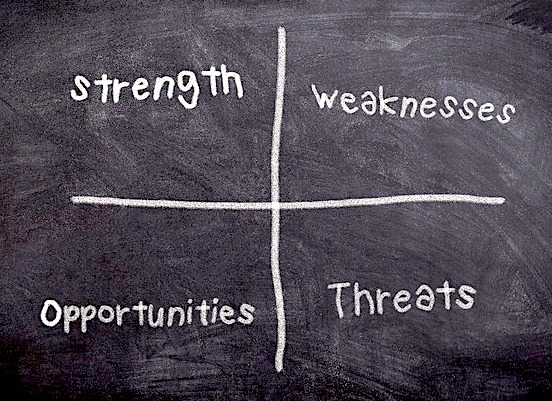Everybody is afraid:
How to use this truth

Everybody is afraid.
It's one of the least-known truths of life, but what does it mean for single people?
We all recognize our own secret fears, or at least all honest people do. Some people are afraid of admitting they have any fears, and that's a fear in itself.
As single people trying to figure out the world around us, we add a piece to the puzzle here and there, and when we see a pattern, life begins to make more sense. Let's look at how this truth explains much of human behavior.
Everybody is afraid: Many fears
What are we so afraid of? The list is endless, but here are a few common fears:
- Loss of job
- Loss of money, security
- Loss of safety, freedom
- Loss of love
- Loss of health
- Loss of reputation, respect
- Loss of self-esteem
- Loss of material possessions
See the pattern? Everybody is afraid of loss of one kind or another. We also fear some things irrationally, such as spiders, snakes, tight spaces, the number 13, and whatever else might lurk in the dark corners of our mind.
We all have basic needs (see Maslow's hierarchy of needs) and we become nervous when we believe a need is threatened.
Our culture contributes to the idea that our needs are not being met. That's how advertising sells us things: It appeals to the belief that if we buy whatever they're pitching, "everything will be all right."
Through experience, most singles learn no product has the power to make everything all right. Christians know that even if all our needs are met, we are still sinners. Everything will not be all right until we get to heaven and our sinful nature is healed.
Why your boss acts that way

Because everybody is afraid, they behave in ways to try to make themselves more secure. Every worker is frightened they might lose their job, including your boss. He or she believes your mistakes or lack of productivity reflects poorly on them, causing a possible threat of termination.
Sometimes their complaints about you are legitimate; other times the boss may feel insecure or slightly paranoid. Typically, the higher the position, the more there is to lose and the higher the level of anxiety. Also, the higher the level in a company, the more pressure there is to perform, resulting in even more stress.
Much has been written about the "imposter syndrome," in which a person feels in over their head, that they do not have the qualifications to succeed. In cases where that actually exists, fear can make a person do strange things.
Knowing everybody is afraid should motivate you to do your best. Your conscientiousness can alleviate some of your boss's fears. But I once had a boss who was a perfectionist. None of her subordinates could please her, no matter how hard we tried. When I realized that was never going to change, I switched jobs. She wasn't going anywhere, so I had to.
Let me emphasize that our anxieties do not make us bad people. They are part of the fallen human condition. Knowing what motivates someone can go a long way in responding wisely to a situation.
Addressing others' fears
Nobody likes to have their fears pointed out to them. We see our fears as a sign of weakness, and none of us likes to admit weakness. Telling someone they're afraid of this or that and what they should do about it is condescending. You will be perceived as arrogant or superior. Your "helpful" advice will not be appreciated.

Often we can't discern what someone else is afraid of, and our guesses may be wrong. Maybe they experienced a tragic event in their past and just can't get through it. That happened in a relationship I was in many years ago. It ended badly.
Here's the takeaway: If you are a Christian, your faith calls you to respond with kindness. The Golden Rule says:
So in everything, do to others what you would have them do to you, for this sums up the Law and the Prophets. (Matthew 7:12, NIV)
We have a responsibility to follow the example of Jesus, but we do not have the obligation to become a doormat. In the relationship I mentioned above, kindness wasn't enough. In the job situation, I had to protect myself.
Does this change anything?
Knowing everybody is afraid is a valuable piece of information, but unless you use it wisely, it can backfire on you. The perfectionist boss I mentioned knew all her employees were worried about losing their jobs during a recession, which emboldened her to mistreat us. She was genuinely shocked when I told her I had found another position and was leaving.
In turn, we are shameful people indeed if we capitalize on others' fears. It is unChristian to be a bully. Anyone who terrorizes another, for whatever reason, commits a serious sin.
When we understand that everybody is afraid of something, it makes it easier to forgive, because we remember what our own fears make us do. This truth is universal. Never think that because someone acts with supreme confidence that they are fearless. The truly fearless person does not exist.
An impossible command?

Jesus knows everybody is afraid. He suffered fear himself at Gethsemane. Dozens of times throughout the Bible we find God and angels telling people "Don't be afraid" or "Fear not."
And yet we are afraid. Is this command humanly impossible to obey?
God always equips us to do what he asks. The key for believers is to keep in mind that God is with us through every trial, even when we can't feel it. We singles think we have to face trouble alone; that is a lie of Satan.
Yes, bad things do happen to good people. I am sure many painful experiences have happened to you that you didn't deserve. If we singles remember that we got through those trials with God's help, it can strengthen our faith for the future.
Understanding that everybody is afraid should make us more merciful. It should motivate us to encourage others. Most of all, it should help us see that all people, ourselves included, sometimes behave poorly because of our fears.
In an ideal world, people—including Christians—would recognize their fear-driven behavior and put the brakes on it before it hurts others. But we live in a sin-stained world and we act and react mostly on our emotions, not logic or consideration for our neighbor.
If you've ever asked yourself, "Why did he/she do that?", this truth may provide a possible answer. I often find myself asking "Why did I do that?," and fear frequently comes up as the reason.
It takes deliberate thought to apply this truth to make worthwhile changes in your life, but God is always eager to help you change for the better. This is not about self-improvement. It's about letting the Holy Spirit conform you to the character of Christ. What better goal could you have than that?







